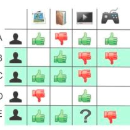Conventional collaborative filtering techniques don't take into consideration the effect of discrepancy in users' rating perception. Some users may rarely give 5 stars to items while others almost always assign 5 stars to the chosen item. Even if they had experience with the same items this systematic discrepancy in their evaluation style will lead to the systematic errors in the ability of recommender system to effectively extract right patterns from data. To mitigate this problem we introduce the ratings' similarity matrix which represents the dependency between different values of ratings on the population level. Hence, if on average the correlations between ratings exist, it is possible to improve the quality of proposed recommendations by off-setting the effect of either shifted down or shifted up users' rates.
翻译:常规合作过滤技术没有考虑到用户评级认知差异的影响。有些用户很少给项目5颗星,而另一些用户几乎总是给选定项目5颗星。即使他们有相同项目的经验,评价风格方面的这种系统性差异也会导致推荐者系统有效从数据中获取正确模式的能力出现系统性错误。为了缓解这一问题,我们引入了评级相似性矩阵,它代表了人口水平不同评级值之间的依赖性。因此,如果平均而言,评级之间存在相互关系,那么通过抵消调降或调换用户比率的影响,就可以提高拟议建议的质量。






